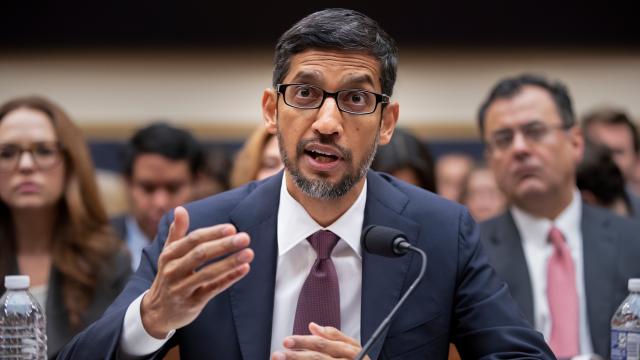Today’s House Judiciary Committee hearing was a clown show — accurately predicted by Minority Leader Nadler as focusing mainly on the outgoing Republican majority’s apoplectic rage towards imaginary conservative bias on Alphabet’s platforms, and largely a rehash of the browbeating doled out to Twitter and Facebook earlier in the year.
Given that Google is a mammoth company setting precedent in the realms of data privacy and transparency, these petty hecklings over supposed partisan favoritism represent a deep abdication of the work that public servitude is supposed to embody, namely consumer protection and anti-monopoly legislation.
Thankfully, a few members of the committee bothered to ask Google CEO Sundar Pichai about one of the company’s most controversial projects: its proposed censored Chinese search product, codenamed Dragonfly.
Responding to questions under oath today from Texas Democratic Representative Sheila Jackson Lee about Google’s plans around Dragonfly — a potential means into the Chinese market the company left in 2010—he stated:
Right now, we have no plans to launch in China, we don’t have a search product there. Our core mission is to provide users access to information, and getting access to information is an important human right. So we are always compelled, across the world to try hard to provide that information. But right now there are no plans to launch search in China.
I’m committed to being fully transparent, including with policy-makers, to the extend that we ever develop plans to do that.
Unsatisfying, as answers go. The agenda of furnishing more information onto more people, without thought to the quality over quantity, is precisely what makes Dragonfly so troubling in the first place.
Later in the afternoon, Representatives David Cicilline Keith Rothfus grilled Pichai more specifically on Dragonfly. “The number of engineers on the project have varied over time,” Pichai told Rothfus, “we’ve had over 100 people working on it, is my understanding.” He would not specifically confirm that a functioning demo of Dragonfly existed, saying only that “we have developed and explored what search could look like if it were to be launched in a country like China.”
Pichai would also not state if there were ongoing product meetings around Dragonfly, but he denied that Google was currently in talks with the Chinese government over a search product. Without specifying the length of development on the project, Pichai sought to downplay the possibility of an eventual Dragonfly launch, saying, “we’ve had the product underway for a while, and there have been other projects that we’ve undertaken for a while and never launched.”
Project Dragonfly has drawn criticism internally, in the form of two open letters from Googlers, each with hundreds of signatures.
Sixty human rights groups around the world, including Amnesty International, the Electronic Frontier Foundation, and Reporters Without Borders, have also called on Google to end development of Dragonfly, noting that “there is a real risk that Google would directly assist the Chinese government in arresting or imprisoning people simply for expressing their views online.”
Googlers noted that if a search product tailor-made to government censorship speculations were deployed, it could “establish a dangerous precedent at a volatile political moment, one that would make it harder for Google to deny other countries similar concessions.”
One senior scientist at Google resigned in protest of the Dragonfly’s obvious ethical flaws, and according to a report by the Intercept, the company’s own security teams were kept in out of meetings about the product.
Crucially, when Pichai was asked today to commit to not launching a censored search product in China, he instead promised to be “thoughtful” and “engage widely,” which one assumes is intended to be reassuring:
We have a stated mission of providing users with information and so we always, we think it’s in our duty to explore possibilities to give users access to information. I have that commitment. But as I said earlier on this we’ll be very thoughtful and we will engage widely as we make progress.
The House is set to flip to a Democratic majority in January, at which point, ideally, further hearings will produce responses of more substance on this especially concerning aspect of Google’s re-entrance to the Chinese market.
